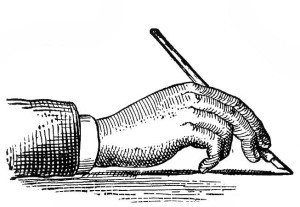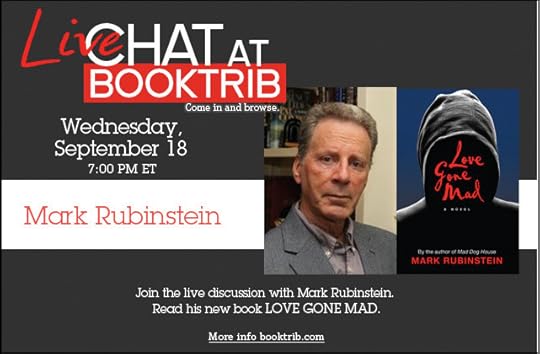Mark Rubinstein's Blog, page 34
October 11, 2013
A Man of Means
Show Me the Money
I was working in a psychiatric emergency room when the police arrived with another potential patient. They routinely foisted disorderly drunks off on the hospital, rather than contend with the paperwork involved in tossing them in the drunk tank.
“There’s no alcohol on his breath,” said the cop, stating his case for a psych admission. “He was in front of the Regency Hotel, saying he planned to check into a suite. Claims he’s got loads of money. He’s got no ID, so he’s a John D...
"Show Me The Money"
“There’s no alcohol on his breath,” said the cop, stating his case for a psych admission. “He was in front of the Regency Hotel, saying he planned to check into a suite. Claims he’s got loads of money. He’s got no ID, so he’s a John Doe.”
Mr. Doe peered at me with wet, bulging eyes. “Thank you for seeing me,” he said in a mellifluous baritone voice any radio announcer would envy.
He was about 50 years old and skeletally thin. He wore a soiled pin-striped suit. It looked expensive—maybe Brooks Brothers. The jacket and trousers were worn at the elbows and knees. His once-white dress shirt was a soiled-looking gray. He wore a silk tie; gold cuff links clasped the shirt’s frayed French cuffs.
He held a bulging, expensive leather briefcase, and a copy of the Wall Street Journal was tucked under his arm. Though unkempt, he looked like an executive.
A torrent of diagnostic possibilities shuttled through my mind. Was he an out-of-work broker or bond trader? Perhaps a former member of some prestigious corporate board who was on the losing end of a hostile takeover? Or was he a street-dwelling charlatan who’d snatched clothes and a briefcase from a Dumpster?
“May I smoke?” he asked.
When I nodded, he produced a flat gold cigarette case, extracted a cigarette, and lit up.
“What brings you here, Mr. Doe?”
“I’m looking for a place to stay…”
“What are you looking for?”
“One with excellent room service. And I need peace and quiet while I do paperwork.”
“What were you doing outside the Regency Hotel?”
“Assessing the clientele. Seeing if I’d be comfortable sharing accommodations with them.”
I asked about his circumstances. He described having thought of going into arbitrage and mentioned the law, saying, “It’s an avocation of mine.” Though his speech was formal—even stilted—I could find no evidence of disordered language or cognition. His voice was mellow—almost honeyed—and I could imagine him doing TV voice-overs. Though John Doe was delusional and disheveled, he possessed a strange worldliness that bespoke a level of sophistication rarely seen in a psychiatric emergency room.
“This looks like a clean establishment,” he said. “How much is a night’s stay?”
I was stunned. He’d gone from assessing the Regency hotel to asking about the rate at a psychiatric hospital.
“I don’t think you’d want to stay here…”
“I’m not a snob, if that’s what you’re thinking.”
“Oh no, but—”
“Let me assure you, Doctor, I’m a mean of means…”
I nodded, hoping my skepticism didn’t show.
“I see you have doubts,” he said. “I have a well-diversified portfolio…including substantial cash, since I was forced to liquidate certain holdings.”
“Do you mean what’s in your briefcase?”
“Yes,” he said, staring at me with those huge wet eyes. “I have enough here to cover a long stay.”
“Carrying that much cash around isn’t a good idea.”
“I assume your establishment has a safe…?”
“Well, Mr. Doe, we have certain criteria for admission…”
“Let me dispel your doubts,” he said, reaching for the briefcase. He stood, set it on the desk and opened it. He tilted it over the desktop.
My pulse quickened.
Thick, banded bundles of money poured onto the desk—stacks of hundred-dollar bills—scores of them. Each bill was emblazoned with a huge “100” within a circle, and in the upper-right hand corner of each was the silhouette of a locomotive, and in the lower-left, a house.
Each finely printed, pale yellow bill in this mountain of cash—was Monopoly money.
“You see, sir,” he said, “I’m well-financed. I’d like a room with a view. Something on a high floor.”
I was intrigued. What exactly was Mr. Doe’s story? I was determined to find out, as I asked the attendants to escort Mr. Doe to his room in our facility.
Mark Rubinstein
Author of Mad Dog House and Love Gone Mad
October 8, 2013
Writer to Writer: A Conversation with Raymond Khoury
 Raymond Khoury is the bestselling author of several novels, including The Last Templar, The Templar Salvation and The Sign. Born in Lebanon, Raymond and his family were evacuated from Beirut’s civil war, and fled to New York when he was 14. He worked as an architect and investment banker before becoming a screenwriter and producer for networks such as NBC and BBC. Since the success of The Last Templar, his debut novel, he has focused solely on writing fiction. His works have been translated...
Raymond Khoury is the bestselling author of several novels, including The Last Templar, The Templar Salvation and The Sign. Born in Lebanon, Raymond and his family were evacuated from Beirut’s civil war, and fled to New York when he was 14. He worked as an architect and investment banker before becoming a screenwriter and producer for networks such as NBC and BBC. Since the success of The Last Templar, his debut novel, he has focused solely on writing fiction. His works have been translated...
October 2, 2013
Write What You Know
We’ve all heard the old dictum: “Write what you know.”
In a very general sense, that’s probably true, but there’s much more to writing novels than sticking with those areas with which you are familiar by virtue of training or education.
As a physician, forensic psychiatrist and novelist, it would be easy for me to write about medicine, psychiatry and courtrooms — all of which have been, or are still, part of my life and experiences. But if I limited myself to those areas — familiar as they may...
Write What You Know
In a very general sense, that’s probably true, but there’s much more to writing novels than sticking with those areas with which you are familiar by virtue of training or education.
As a physician, forensic psychiatrist and novelist, it would be easy for me to write about medicine, psychiatry and courtrooms—all of which have been, or are still, part of my life and experiences. But if I limited myself to those areas—familiar as they may be—my novels would be one-dimensional and repetitive.
So the logical question is, “If you are going to write about what you know, what exactly do you know?”
We all know far more than we think we do. After all, we’ve all had experiences of many kinds.
Haven’t we all felt lust, envy, love, anger, fear, anxiety or sadness? Haven’t we all experienced loss, or a sense of triumph, large or small? Haven’t we all quested for something—no matter how great or inconsequential—and haven’t we all been frightened, disappointed, or felt unsettled, worried, or exhilarated about something?
Hasn’t each of us encountered people of every stripe imaginable—those who are kind, gentle, caring, or those who are mendacious, manipulative, or even evil? Some people are naïve and childish while others are braggadocios or overbearing. And still others can sadden us or fill us with a sense of comfort and well-being.
We’ve all been to school, to social gatherings, movies, concerts, business or professional meetings. Every one of us has walked through a city or woodland, or played a sport or been carried away by a movie, play, novel, or television program.
We’ve all had experiences as kids, teens, and as young adults—and we’ve all had first loves or felt overwhelmed by circumstances that seemed beyond our control or understanding. We’ve each encountered illness, threats, and feelings of helplessness, hopelessness, guilt or shame—whether warranted or not.
And at some point in our lives, we all deal with growing older, with the loss of friends, the death of a loved one, and eventually, we must come to the realization that we ourselves are mortal and just passing through this world.
In other words, we all live life.
And that’s what we know.
So if you write about what you know, you are writing about a universal experience: life.
Mark Rubinstein,
Author, Mad Dog House and Love Gone Mad
September 30, 2013
The Magic of a Novel
 We’ve all had the experience of reading a novel and being caught up not only in the story, but in the characters (think of Gone Girl and Catcher in the Rye). It’s partly a matter of having an interest in one or another genre, but most of us have enjoyed novels that are not from our preferred reading landscape.
We’ve all had the experience of reading a novel and being caught up not only in the story, but in the characters (think of Gone Girl and Catcher in the Rye). It’s partly a matter of having an interest in one or another genre, but most of us have enjoyed novels that are not from our preferred reading landscape.
There are probably several reasons why a novel can grab and hold you so you’re sorry the read is coming to an end.
First, there’s the story itself. It resonates on some level. It taps int...
September 27, 2013
Who Gives a Diagnosis?
Some years ago, I was called upon by a plaintiff’s attorney to evaluate his client in relation to a personal injury lawsuit. She was a 55-year-old woman who had tripped on an ice-covered sidewalk and fractured an ankle. She also bumped her head, but had not lost consciousness or sustained any other physical injury. The attorney wanted to know if in addition to the fractured ankle, she’d sustained any psychiatric injury. If so, he would incorporate my opinion into the court papers he was filin...
September 24, 2013
Writer to Writer: A Conversation with Barry Eisler
 Barry Eisler is the best-selling author of two thriller series, one featuring John Rain, a half-Japanese, half-American former soldier turned freelance assassin; and another featuring black ops soldier Ben Treven.
Barry Eisler is the best-selling author of two thriller series, one featuring John Rain, a half-Japanese, half-American former soldier turned freelance assassin; and another featuring black ops soldier Ben Treven.
After graduating from Cornell Law School, Barry joined the CIA and held a covert position with the Directorate of Operations. After leaving the organization, he worked as a technology attorney and startup executive in Silicon Valley and Japan, and earned a black belt at the Kodokan I...
September 22, 2013
Live Chat at Booktrib
Did you miss the live chat? No worries! You can watch/listen to it here: http://bit.ly/15kmagU
“Mark Rubinstein has done it again with another psychological thriller guaranteed to raise goosebumps. This time, the cauldron of suspense is filled with large doses of danger, intrigue, and lust. …Love Gone Mad will keep you on the edge of your seat…Be prepared for unexpected twists and turns that leave you exhilarated and begging for more.”
– Judith Marks-White, author of Seducing Harry and Bachelor...
September 20, 2013
A MATTER OF SANITY
There are chilling reports about Mr. Alexis which bring to mind James Holmes, the Aurora, Colorado shooter and Adam Lanza, the Newtown, Connecticut mass murderer. In these horrific instances, reports of the shooters’ mental illnesses emerged after the incidents, which left many innocents dead or injured. However, the existence of these people’s mental illnesses were known before the rampages took place.
After a mass killing by a disturbed person, the usual arguments have begun. Once again, there is pressure for legislation regarding background checks for mentally disturbed people. “Given the clear connection between recent mass shootings and mental illness, the Senate should not delay bipartisan legislation that would help address this issue,” Senators Kelly Ayotte, Republican of New Hampshire, and Mark Begich, Democrat of Alaska, wrote Wednesday in a joint statement to the Senate leadership. (The New York Times, September 19, 2013).
As a psychiatrist, I would proffer a suggestion regarding some semblance of sanity in this hot-button issue. As a society, we routinely accept that the state has the undeniable right to test people’s ability to drive through written and road tests. In addition, one must pass a visual acuity test. Physicians are required to report to the state if they determine a patient can no longer safely operate a motor vehicle. We would never issue drivers’ licenses to blind people. Many states require that elderly people, already licensed to drive, be retested to maintain their drivers’ licenses. These rules and regulations seem completely sane, and are in the interests of the common good.
Equally sane and in the interest of the greater good would be federal legislation mandating anyone with certain psychiatric diagnoses (Paranoid Schizophrenia; certain types of dementia; and other psychotic disorders) be entered into a federal database, prohibiting them from gun ownership. Yes, we can anticipate controversy about “Big Brother” government, “discrimination” or impingement on “individual rights.”
However, as a psychiatrist who has seen up close, the workings of deranged minds, such legislation makes eminent common sense and is a matter of societal safety.




